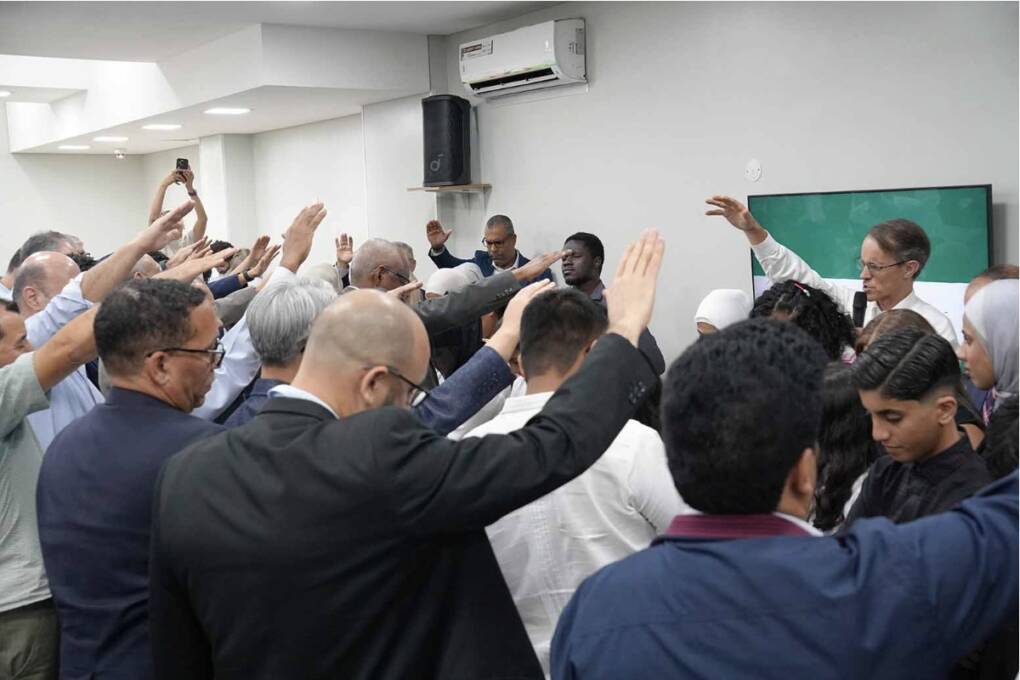 4 December 2025
4 December 2025
 Daniel – Strong in Faith. Faithful in the Fire
Daniel – Strong in Faith. Faithful in the Fire
Devotions from the life of a young man of conviction
 5. Courage for the Truth – When steadfastness costs you something
5. Courage for the Truth – When steadfastness costs you something
Why faithfulness to God is sometimes uncomfortable – but always worth it
 Daily Verse
Daily Verse
“Whether our God saves us or not – we will not serve your gods.”
– Daniel 3:18
──────────────── ────────────────
────────────────
 Introduction: When conviction comes under pressure
Introduction: When conviction comes under pressure
Everyone wants to be courageous – until it becomes uncomfortable.
Until people turn away.
Until the opinion of the crowd grows loud.
Until the price becomes tangible.
In these moments it is decided whether faith is real – or only external.
And it was exactly into such a moment that Daniel’s friends came: Shadrach, Meshach and Abednego.
──────────────── ────────────────
────────────────
 Devotion: And the courage of his friends in the fire
Devotion: And the courage of his friends in the fire
It was a day like many others in the kingdom of Babylon. The sun shone over a wide plain, people streamed together, and a gigantic golden statue gleamed in the light, so tall that its shadow darkened the crowd. King Nebuchadnezzar had it built – a symbol of his power, his pride, his control. And he had given a clear command: when the music sounded, everyone was to kneel down and worship the statue. Whoever refused would face the fire – not as a metaphor, but as a glowing, deadly furnace whose heat could be felt from afar.
In the middle of the crowd stood three men: Shadrach, Meshach and Abednego, friends of Daniel, men who, like him, had been carried off to Babylon. They had learned to live in a foreign culture, to speak other languages, to accept different customs – but there was a line they would never cross. Their hearts belonged to God. And when the music began, when trumpets, harps and flutes filled the air and thousands around them dropped to the ground like a wave, they remained standing.
For a moment the world seemed to fall silent. Everyone could see that they were not kneeling. There was no anger in their eyes, no arrogance, no rebellion. Only determination. They knew what this moment could mean. They knew that it would draw attention to them – and that the price would be high. But their conviction was deeper than their fear.
They were brought before the king, and Nebuchadnezzar looked at them with astonishment and anger. He offered them the chance to reconsider their decision. Once more the music was to sound, once more they were to kneel. But their answer came calmly, clearly and without hesitation:
“Our God can save us. But even if he does not – we will not serve your gods.”
It was not defiance. Not dramatic heroism. It was trust – not only in God’s power, but in God’s wisdom. Not only “God can”, but “God may decide”.
The furnace was heated, hotter than ever before. The heat was so intense that even the men who threw the three into the flames died in the process. For most, this would have been the end of the story. But in the fire something happened that no one had expected.
Nebuchadnezzar jumped to his feet. “Did we not throw three men into the fire?” he asked. “Why do I see four? And the fourth looks like a son of the gods!”
Right in the middle of the fire someone was with them. A companion in the flames. A sign that God does not only stand at the edge of catastrophe, but in the midst of it. When the three finally came out, nothing on them was burned. Not a hair was singed. No piece of clothing damaged. Not even the smell of smoke clung to them. What was meant to destroy them had not even touched them.
The king was speechless. And in front of all the people it became visible what had previously been known only in their hearts: faith that holds – even when it costs something.
──────────────── ────────────────
────────────────
 What does this mean for us?
What does this mean for us?
Maybe you want to follow Jesus – but preferably without conflict.
Without rubbing anyone the wrong way.
Without headwind.
But real discipleship will sooner or later be challenged:
-
When you say “no” where everyone else says “yes”.
-
When you remain honest even though lying would be easier.
-
When you hold on to God’s truth even though it is unpopular.
It is precisely then that it becomes clear whether your faith is merely comfortable –
or whether it also holds in the “fire”.
God does not always promise that you will escape the fire.
But he does promise to be with you in the fire.
──────────────── ────────────────
────────────────
 What we can learn from Shadrach, Meshach and Abednego
What we can learn from Shadrach, Meshach and Abednego
-
Courage in faith does not mean: “Nothing will happen to me.”
Courage means: “I will remain faithful, no matter what happens.” -
Faithfulness to God is more important than approval from people.
-
God can save – but we trust him even when he acts differently than we expected.
-
God’s nearness often becomes especially visible in the “fiery seasons” of our lives.
──────────────── ────────────────
────────────────
 Practical steps for today
Practical steps for today
-
Name your “fire”:
Think about where you are under pressure today to deny or hide your faith. -
Make a clear decision:
Decide that in one concrete situation today you will consciously stand for God’s truth – kindly, but clearly. -
Seek God’s nearness in the fire:
Instead of only asking God to take the problem away, ask him to be close to you in the fire. -
Remember God’s faithfulness:
Think of situations in which God has already carried you – and thank him for them.
──────────────── ────────────────
────────────────
 Questions for reflection
Questions for reflection
-
Where is my faith currently costing me something – and am I willing to pay that price?
-
In which areas do I tend to adapt instead of taking a stand?
-
What would it look like in practice if I “remained standing” today while others “kneel”?
──────────────── ────────────────
────────────────
 Prayer
Prayer
Lord,
I want to be faithful to you – even when it costs me something.
Give me courage to stand for you when others turn away.
Help me to value your truth more highly than people’s opinion.
Be with me in the “fire” of my decisions.
Strengthen my faith that you are faithful –
whether you preserve me or lead me through hardship.
My life belongs to you.
Amen.
──────────────── ────────────────
────────────────
 Key thought of the day
Key thought of the day
Real courage in faith does not mean escaping the fire – but trusting God in the fire.
──────────────── ────────────────
────────────────
LumenCorde | Daily light for a living soul.

 (
(

